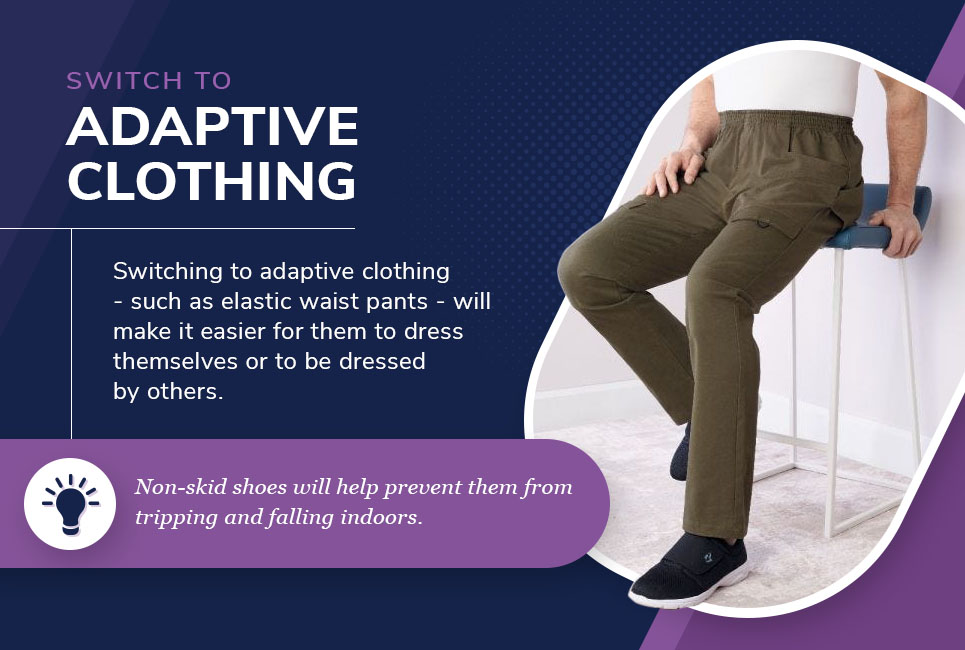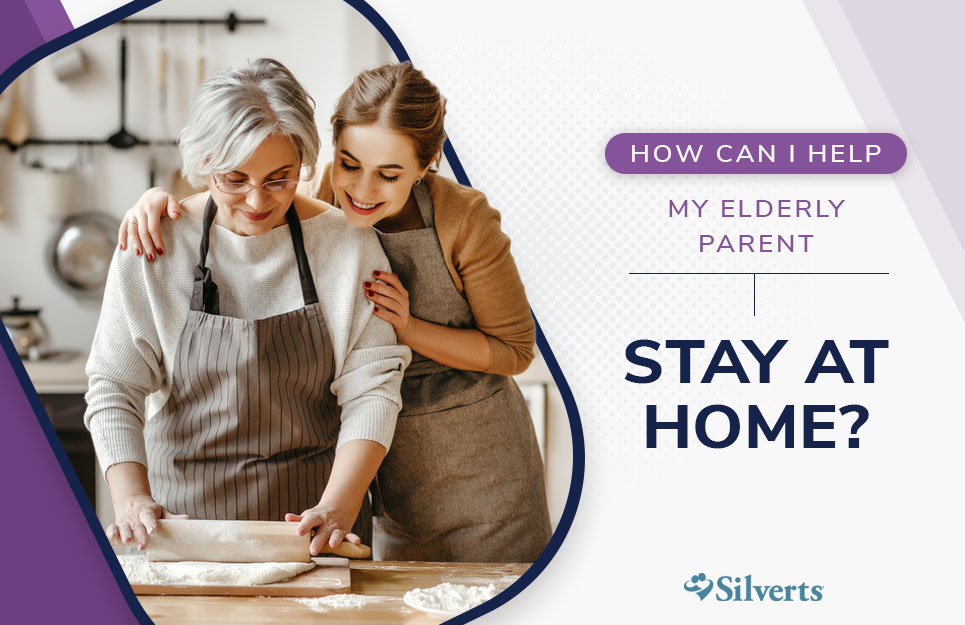How Can I Help My Elderly Parent Stay at Home?
Aging in place is often a goal for seniors and their adult children. However, few adults know how to help their elderly parent stay at home. After all, your parents only age once, so it’s not like they have done this before. That’s why we’ve compiled this guide of 13 tips to help an elderly parent stay at home. From conducting a home safety audit to switching to senior clothing, here’s what you need to know about helping your older loved ones age in place:
Determine how much care they need.
The first step in helping your loved one stay at home is determining how much care they need. Do they need someone to stop in for a few hours a couple of times a week, or do they need almost around-the-clock care? Do they need help with medical tasks such as taking medication or administering injections, or more assistance with daily chores like cooking and cleaning? Spend a couple of days with your loved ones and observe how they do on their own and what they struggle with. Many older people are in denial about how much and what kind of assistance they need, so it’s best to see it with your own eyes if at all possible.
Have a conversation with them about their needs and wants.
That being said, you should still sit down with your loved one and have a conversation with them about what their needs and wants are when it comes to aging in place. You might be surprised to discover what assumptions you have made about their wishes and what they truly want or need. Talking about aging can be uncomfortable for both the parent and the child, but open communication is so important for making the right decisions. If your parent is still lucid and able to talk about such things, then block off some time to sit down and hash it all out.
Browse Our Selection of Senior Clothing
Know how much support you can give.
Likewise, you should also have a conversation with yourself about how much you can contribute to your aging parent’s care. Caring for an aging parent can be a big drain, both mentally and emotionally. It usually leaves you less time and energy to put towards other activities, such as caring for your children or working a full-time job. If you have other commitments, be realistic with yourself about how much you can give to taking care of your elderly parents. Keep in mind that just because they don’t need a lot of help now doesn’t mean that they won’t need more assistance in the future, so be prepared for that possibility later on down the line.

Consider your care options.
Next, it’s time to consider your care options. On the one end of the spectrum is you (and perhaps your siblings or partner) caring for your parent full-time on your own. On the other end is around-the-clock care, via a private nurse or a senior living facility. While you might think these are your only choices, in the middle there are other possibilities, including a part-time home health aide who visits them at home a few days a week. Hiring part-time help can allow your parent to age at home even if you can’t be available to provide around the clock care for them.
Conduct a safety audit of their home.
Most houses aren’t designed with the elderly in mind, and it can be quite expensive to retrofit some houses in order to make them suitable for aging in place. Conduct a safety audit of your parent’s home and list all the changes you would need to make in order to keep it liveable for them. Some of the changes, such as replacing round doorknobs with lever handles, will be simple and relatively inexpensive. Others, such as installing a stair lift, will cost a lot more money and involve hiring outside contractors. If you’re thinking that it would be more affordable to move your parent into your house, make sure that you conduct the same safety audit and run the same financial calculations on your own home that you would for theirs. (Review our home safety checklist for seniors to make sure you don’t miss anything!).
Run the numbers on the finances.
Once you have determined what kind of help your parent needs and how much money it would cost to stay in their house, it’s time to crunch the numbers and see what the finances look like. You might be surprised by what you discover. In some cases, it might actually be cheaper to move them into a new house instead of fixing up their current one, or to move them into assisted living than to hire 24/7 private caregivers. Be realistic about how far their retirement savings and Medicare payments will stretch, as well as how much money you and your siblings can contribute to their care. Don’t commit to a care arrangement that you can’t sustain financially!

Create an emergency plan.
If you do decide that it’s feasible for your parent to age in place in their own home, then you need to create plans for different emergency situations ASAP. For instance, if they fall and can’t get to the phone, how will they call for help? If they need to be hospitalized, what facility will they go to and who will take them there? What will they do in case of a natural disaster such as a flood or hurricane? Run through different scenarios with them so you will all be prepared in a worst-case situation. It’s a wise idea to have “go bags” ready for both hospital trips as well as natural disasters. Make sure that they have essentials such as clean water, first aid kits, flashlights, etc. Contact information for doctors, emergency rooms and other medical essentials should also be posted clearly on the fridge or another visible location.
Review their daily activities.
If you will be the primary caregiver for your aging parent, then you might want to undertake a second review of their daily activities to pinpoint where they need the most help, as well as what schedule they are on. For example, they might take their meals at a different time than the rest of your family does. Helping older adults to stay on a schedule as much as possible is important for helping them to stay grounded and feel secure, especially if you are moving them into your house, which is already a pretty big disruption. Do what you can to help them maintain a routine while slowly phasing in positive changes that will promote their mental and physical health. Try to only alter one thing at a time instead of overhauling all of their daily activities at once.
Make the necessary upgrades to their home (or yours).
During your safety audit, you almost certainly identified multiple changes that needed to be made to your parent’s home — or your own home, if you are planning to move them in with you. Go through the list of changes and rank them according to importance, cost and ease of implementation and then use that ranking to determine the priority that you will tackle them in. Some changes, like getting non-slip bath mats or removing rugs, will be quick and relatively cheap and easy to do. Others, such as renovating a bathroom, will be more involved and incur a bigger financial cost. It is important to get these updates done as quickly as possible, but not at the expense of quality and good work. Shoddy renovations could pose even more danger to your elderly parent down the line, so do it right the first time so you don’t have to worry about it again.

Don’t forget about lifestyle changes.
Home renovations are only the tip of the iceberg when it comes to aging in place, and there are other updates and gadgets that can make things easier on your elderly parent. For example, switching to adaptive clothing for seniors — such as elastic waist pants for elderly women — will make it easier for them to dress themselves or to be dressed by others. Wearing non-skid shoes for swollen feet at all times will help prevent them from tripping and falling indoors. Rubber grips will allow them to hold utensils, tools and makeup brushes even if they have arthritis. If you’re not sure where to begin, try searching for Alzheimer’s and arthritis tools to get started.
Help them stay active.
Staying (or becoming active) is key to maintaining both mental and physical health as you age. However, many older adults struggle to stay active in their golden years. Go-to workouts such as running may no longer be feasible for their joints, and it can be tough to get themselves to the gym once they no longer drive. Do what you can to support your parent’s physical activity, whether that’s helping them find a senior workout class or committing to drive them to the gym three times a week. If they don’t like the first thing they try, encourage them to keep experimenting. There are dozens of types of workouts available and one is bound to work for them eventually.
Encourage them to maintain social connections.
Many older adults feel isolated and lonely, which can contribute to depression, anxiety and other physical and mental health conditions. Seniors also find it tough to maintain friends for a variety of reasons, including difficulty driving and diminished energy for social events. Any support that you can provide for them to maintain social connections will make a big difference in the short- and long-term, whether that’s hosting their friends at your house or driving them to dinners and book club meetings. If your parent is extremely extroverted and needs a lot of social time, it might actually be beneficial for them to move into an assisted living facility with a lot of planned events instead of being stuck in their home all day, so keep that in mind as you’re weighing your care options.

Watch out for scams.
Anyone of any age can fall for a scam, but unfortunately, older adults are more susceptible to them (and some scammers will target older adults specifically because of their vulnerabilities). Talk with your loved ones about how they can protect themselves from common types of scams, including health insurance scams, telemarketing scams and lottery scams. If their cognition is beginning to decline, you might need to take steps to transfer control of their finances to yourself or another family member in order to protect them from potentially costly financial mistakes. Be honest with yourself about your loved one’s awareness and whether or not they are mentally sharp enough to protect themselves from such scams.
Want to help your elderly loved ones maintain their dignity and independence while getting dressed in the morning? Adaptive clothing from Silverts can make both self dressing and assisted dressing easier for everyone involved. Shop adaptive clothing for both men and women and get free shipping on all orders within the contiguous US!
Image Credits
Anci Valiart/Shutterstock.com
IWOZON/Shutterstock.com
Photographee.eu/Shutterstock.com
Andrey_Popov/Shutterstock.com
Evgeny Atamanenko/Shutterstock.com





Comments
i like this article, it has a lot of info i need to know, thanks for sharing